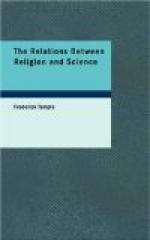Science, from the time when it recognised itself as Science, has owed its development to observation of nature, and long before it shook off the fetters of unexamined tradition it had disclaimed, even for that tradition, any other basis than this. But not so Religion. Many religions, and among them the purer and higher religions, in proportion to their nearer approach to perfection, have claimed to rest on a Divine Revelation, and to be something more than either speculations of philosophic observers of nature, or deductions from innate principles of reason or conscience. Not thinkers, but prophets, or men claiming to be prophets, have given the purest religions to their disciples among mankind. It has always been possible to bring all religious teaching to the bar of conscience; it has been possible to put all religious teaching to logical examination; to systematise its precepts, whether of faith or conduct; to inquire into its fundamental principles, and to ask for the authority on which the whole teaching rests. But these applications of our intellectual faculties to Religion have always been admitted as coming after, not as preceding, the teaching to which they are made. The prophet does sometimes reason when he is deducing from principles already accepted, new precepts, or new prohibitions; but he does not confine himself to such reasoning in the fulfilment of his mission. He professes to have a message to give. He will accredit it by such means as He supplies Who has sent him with this message. He will, in order to open the consciences of his hearers, appeal to past revelations which they have already received, and with which his new message is in thorough harmony; but he often appeals also to his power over nature to bear witness that the Lord of nature has sent him. The Hebrew prophet will appeal to the teaching of the Law, will repeat the old revelation with its old unshaken and unshakeable precepts, but he will not stop there: he will also give signs from the Lord to prove that he has a right to the title of prophet which he claims. Armed with this title, he will go on to predict the coming of the Great Restorer, the Messiah; he will insist on the judgment of all things, sure to be passed in its appointed day; he will hint at the immortality of the soul, and the execution of the Almighty justice on every man that lives.
It is probable enough that many of the inferior religions have grown up with no such claim at all. The worship of ancestors, where it has prevailed, has very likely, as has been suggested, grown out of dreams, in which loving memory has brought back in sleep vivid images of the dead who were reverenced while they lived, and cannot be readily forgotten after death. Such worship barely attains to what may be called in strictness a religion. Its connexion with the spiritual faculty, the true seat of religion, is weak and vague. It is like the honour paid to a sovereign residing in a distant capital, with only the difference




